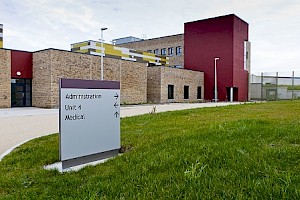Youth Justice
Ireland has a long history of poor responses to offending behaviour by children. A core strand to IPRT's work since its establishment in 1994 has been the promotion of a more effective youth justice system, with emphasis on non-custodial alternatives, diversion, early intervention and prevention strategies and programmes. Central to our work was ending the practice of detaining children in adult prisons, which was in breach of international human rights standards and a serious stain on Ireland's human rights record.
International human rights standards, and in particular the provisions of the UN Convention on the Rights of the Child, are clear that custody for children should only be used as a last resort and for the minimum required period of time. All efforts should be made to apply alternatives to detention to ensure that such a measure is only used in exceptional circumstances.
In Ireland, the Children Act 2001 recognizes the principle of detention as a last resort. The Act prohibits the imprisonment of children and the Criminal Justice Act 2006 makes provision for all children less than 18 years of age to be detained in Children Detention Schools. The detention school model is focused on a model of care, education, health and programmes that address offending, with improved outcomes for the young people, their communities and all of society. The Irish Youth Justice Service is responsible for the Children Detention Schools, within the Department of Children and Youth Affairs.
Following years of sustained advocacy by IPRT, along with many national and international bodies, in 2012 the detention of boys aged under 17 at St Patrick's Institution ended. In March 2017, a Ministerial Order ended the sentencing of children aged under 18 to adult prison in Ireland, and in April 2017, St. Patrick’s Institution was finally closed. Since September 2017 boys aged under 18 are no longer detained in the adult prison system.
IPRT continues to work towards progressive change in youth justice policies and practice, as well as engaging with wider policy and practice issues relating to youth justice, such as the provision of alternatives to detention, diversion and early intervention programmes.

Guardian: Spending Early on Children in Care
31st March 2010
The complex needs of children in care - why investing in their future is investing in our own.
Sunday Independent: Juvenile Detention Centre Plans Shelved as Funds Fall
29th March 2010
Plans to build a new juvenile detention centre at Lusk, Co. Dublin to replace St Patrick's institution have been once again pushed back with no planned completion date.
UK: Perceptions of Anti-Social Behaviour
9th March 2010
Home Office research highlights the subjective nature of perceptions of anti-social behaviour.
Council of Europe: Consultation on Child-Friendly Justice
2nd March 2010
Do you know someone aged 17 or under? The Council of Europe is currently seeking the views and experiences of children and young people to feed into forthcoming guidelines on child-friendly justice. Survey closes 31st March 2010.
UK: Spending public resources to imprison children is making society less safe
1st March 2010
'Punishing costs: How locking up children is making Britain less safe' is a new report from the Social Economics Foundation, which presents new results on the full cost to society of the use of prisons. It outlines a policy to change the pattern of public spending for a safer and more inclusive society.
Irish Examiner: Drop of 64% in offence rate by youths in scheme
26th February 2010
A new one-on-one young offender management scheme shows impressive results.
Irish Examiner: Jobs key to prevent prisoners reoffending
26th February 2010
Interviews with young offenders in St. Patrick's Institutions reveal their opinions on reoffending.
UK: Intensive Fostering for Young Offenders
26th February 2010
A pilot scheme in the UK opts for intensive fostering for young offenders rather than prison.
UK: 'Trial and Error' - Children and young people in trouble with the law
25th February 2010
'Trial and Error- Children and young people in trouble with the law' provides a guide to charities on the issue of young offenders and how charities should tackle this problem.
UK: 'Out of Trouble'
25th February 2010
Prison Reform Trust campaign to drastically reduce the number of children and young people in prison.




